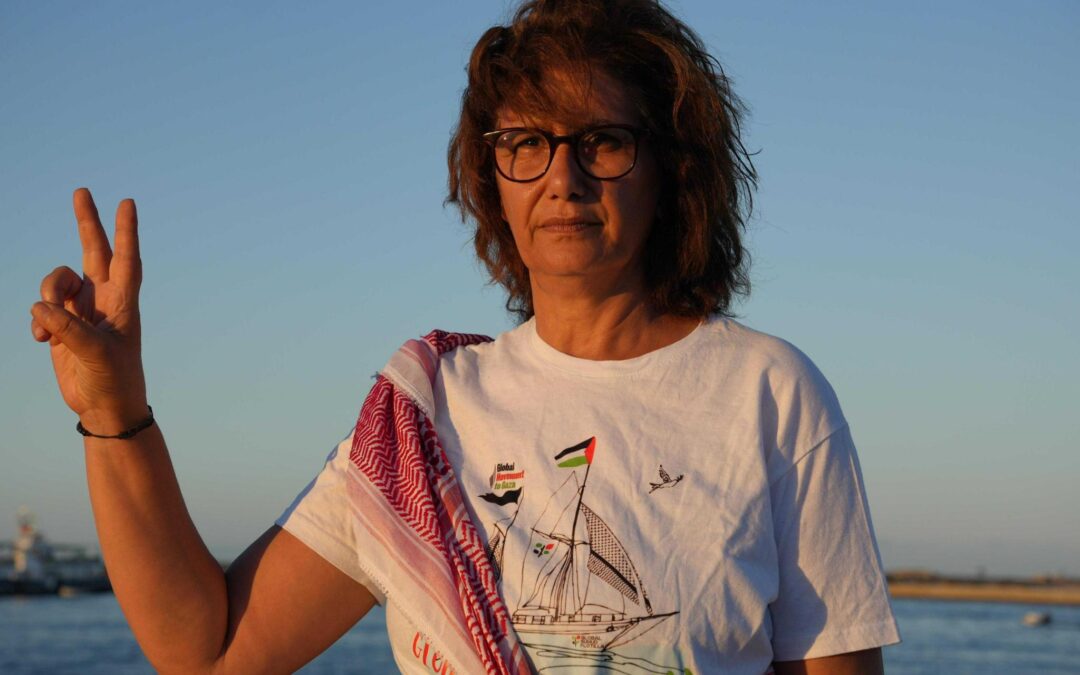The following article was originally published in Spanish in Público:
Néstor Prieto Amador
Jaldia Abubakra was born in Gaza in 1967, the daughter of a Palestinian family displaced by the Nakba of 1948. She grew up as a refugee in her own land and, after becoming an orphan at the age of nine, had to leave Palestine, pass through Egypt, and finally arrive in Spain, where she has lived for four decades.
Today she is sailing across the Mediterranean from end to end with the Global Sumud Flotilla in an attempt to return to her land. She does so despite being labeled a “terrorist” by the Israeli press and despite explicit threats of reprisals against the families of the Palestinians on board if they continue to the end.
“The objective we are going for is much greater than whatever may happen to us,” she says calmly from the port of Bizerte, the Tunisian city where all the ships of the initiative have regrouped. “I believe this flotilla is an act of practical solidarity with Palestine; since this phase of the genocide began nearly three years ago, the world is changing.”
This is not the first time Jaldia has embarked on a flotilla. In 2016 she tried to reach Gaza with the “Women’s Boat to Gaza,” although she could not complete the journey due to health and logistical problems. This time, her only fear was experiencing severe seasickness again: “When I found out that I could join the flotilla, I did so without thinking. The only thing that scared me was being a burden because of the seasickness.”
She made the decision even though—she notes—many people advised her not to. Her Palestinian origin and her activism in organizations such as Samidoun—a network supporting Palestinian prisoners—and Masar Badil, both considered terrorist by Israel and several Western countries, have placed her in Netanyahu’s crosshairs. “We cannot allow ourselves to be intimidated: the struggle has a price and requires sacrifices.”
In Gaza, her brothers, uncles, and a large extended family await her. “When I spoke with them, they asked me where I was; I told them I was away from home, but eventually I couldn’t keep lying to them,” she says. “When I confessed, they asked me to get off [the flotilla], that I could be killed or imprisoned… but I replied that they are already being killed and imprisoned.”
Her words convey certainty, but the fear that families will pay the price has led nearly a dozen Palestinians to abandon the mission. In Gaza, “they are afraid for us, not only for me but for everyone,” she explains. “They feel the world has not forgotten them, but at the same time, they want to protect us and ensure nothing happens to us.”
After drone attacks on several of the flotilla’s vessels and threats of exemplary punishment against its crew, the atmosphere among some participants has become tense. For Jaldia, this escalation is because Israel “fears the flotilla.” “I think the attacks and statements show weakness and nervousness: they don’t know what to do with so many people,” she asserts with a half-smile. “This is the largest solidarity initiative with Palestine in a long time, and they want to stop it by any means.”
Spain, a country of solidarity
Jaldia is one of more than thirty people with Spanish nationality aboard the flotilla, one of the largest delegations. For her, Spain is a country of solidarity, she says proudly, “because of all the people who are in this flotilla.”
“Since 1986, when Spain recognized the State of Israel, Zionist propaganda began to take root and a very important battle over the narrative began,” she notes. Even so, she considers Spanish society to be “always and everywhere in the State, in solidarity.”
In her view, solidarity has changed substantially since October 7. “Before, it was a mix of empathy and pity because Palestinians were victims. Now we are beginning to win the discourse that the Palestinian people are resisting and have the right to do so in all forms. This line has increasing support. We don’t want pity: we want the legitimacy of our resistance to colonization to be recognized.”
The mass mobilizations in support of the flotilla “have forced governments to do something, even if only empty statements,” she says. “I think the Spanish government will have to act on behalf of its citizens, though I don’t know how far they can go. Some statements have already been made because they had no other choice. What we hope is that the people continue mobilizing until that support is turned into practical actions.”

